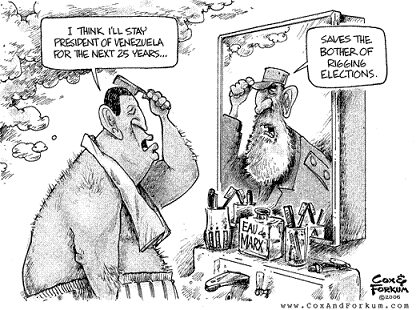Chavez, Evo & Fidel

I read a few days ago that Venezuelan President Hugo Chavez managed to get an extra year added to his third term as leader of the South American nation. I can clearly see where this is going. For those who understand Political Science, it smells like dictatorship at its best. Dictators always fascinate me, because it’s impossible not to draw a line of thinking based on previous leaders. Dictatorship is an open road for dramatic changes and repression of opposition, a dream worthy of Julius Caesar. As much I disagree with this form of government, a certain dosage of dictatorship does shake up secular societies, some used to exploitation of others, and initiate waves of socio-economic changes at full speed. There are no blue-prints for dictatorship… Lots of chaos, but no bureaucracy.
I still remember when Hugo Chavez won his first election. The man rose with the promise of the low-middle Venezuelan working class, with a clean military background and Amerindian blood. …There’s nothing more dignifying than natives overpowering the established European-ruled minority. Through his first term, Chavez managed to play his political game well, and increased support for his political base in the Venezuelan Congress and the Supreme tribunal. His efforts were well strategised and paid off by setting the same man in power for a second term. It was marked by erasing Venezuelan identity and creating a false socialist ideology, which contributed to the removal of the last of his opposition.
Giving credit to his egocentric persona, Chavez realised that a considerable part of the Venezuelan natural resources belonged to foreign oil and mining companies, which made his nation a joke to many. Besides changing the national flag and anthem, and removing important facts from school books, Chavez made the best move of his second term by illegally removing the international companies with investments in petroleum, creating powerful enemies such as Brazil, the USA and the UK. Despite American criticism, Hugo purchased thousands of second-hand AK-47 rifles for his militia, which was made up of illiterate supporters. He did expect a North American intervention at that stage. Because the USA and allies were busy with bigger fish, the end of Hugo Chavez second term was marked by his allying himself with a dying Fidel Castro-and claiming to be his rightful successor, as well as financing his neighbour Evo Morales of Bolivia (another Amerindian and Coca farmer) into power.
These changes haven’t shaken the ascension of a democratic South America into an important role as a main source of bio-fuel in times of global warming. His decision to remove the control of Venezuelan oil from the hands of international investors (which included Petrobras – the Brazilian oil company which had control of 57% of the Venezuelan oil and gas resources) only created further problems with his giant neighbour. It increased Brazil’s need to accelerate their investment in drilling new sources of oil within Brazilian borders and to intensify research on bio-fuel alternatives. A direct challenge to Venezuela’s source of wealth.
In his third term, Chavez is seen by the international community as an empty man. The newspaper headlines and his appearances on numerous television channels around the world has only reinforced his poor performance as leader. From a politician with an extraordinary promise to just another on the list of failed dictators, Chavez today finds himself at the mercy of a resentful Brazil and its side-kick Argentina, a suspicious republican America and a sceptical Europe. This leaves Venezuela to deal with third grade technologies such as Iran and China.
This extra year represents the unlimited term for Hugo Chavez, and likely to Evo Morales and the other dying dinosaurs of the backward utopian agendas that socialism has presented to us over the past century. I do feel sorry for the Venezuelans and Bolivians. They now belong with Cuba.
Filed under: Blogging | Leave a Comment
No Responses Yet to “Chavez, Evo & Fidel”